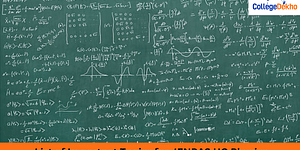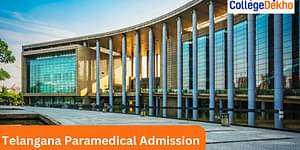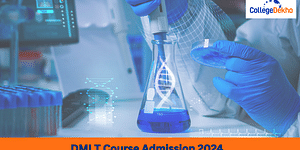BSc Optometry Syllabus & Subjects 2024
BSc Optometry syllabus is divided into 6 semesters over the course of 3 years. The most important Optometry subjects are vision theory, orthoptics, clinical optometry, dispensing optics, etc. The BSc Optometry syllabus provides an extensive knowledge in the study of the human eye, allowing future optometrics to grasp the intricate details of the field. It includes the diagnosis and orthoptic treatment of oculomotor dysfunctions, public health optometry education on ocular hygiene, related nutritional and environmental counselling, and visual rehabilitation and follow-up of low vision patients.
Optometry Course Syllabus & Subjects Overview
BSc Optometry syllabus is divided into six semesters over the course of three years that is focused on dealing with diseases and inventing methods to treat eyes against pollution and ultraviolet rays. Optometry subjects include vision theory, orthoptics, clinical optometry, dispensing optics, etc. The Greek words opsis, which means ‘view’, and metron, which means ‘something used to measure’, are the origins of the word ‘optometry’. The earliest investigations into optics and how the eye forms images can be traced to the birth of optometry. Thus, BSc Optometry is the study of the human eye and issues pertaining to its anatomy and vision issues.
BSc Optometry syllabus aims to impart knowledge and skills in a variety of areas, including the diagnosis and orthoptic treatment of oculomotor dysfunctions, public health optometry education on ocular hygiene, related nutritional and environmental counselling, and visual rehabilitation and follow-up of low vision patients. It also aims to correct refractive conditions of the eye and prescribe glasses, design and fit contact lenses, aniseikonic lenses, and low vision aids. An Optometry course graduate is a doctor who focuses on impaired vision and, if any abnormalities are found, offers the best possible course of therapy. With their ability to treat visual impairment and eliminate avoidable blindness, optometrists play a crucial role in the community.
Table of Contents
- Optometry Course Syllabus & Subjects Overview
- BSc Optometry Course Structure
- BSc Optometry Syllabus (Semester-Wise)
- BSc Optometry Subjects (Year-Wise)
- BSc Optometry Practical Subjects
- Optometry Subjects Offered With Specialisations
- BSc Optometry Course Syllabus Project
- BSc in Optometry Syllabus: Teaching Methods
- BSc Optometry Best Books
- FAQs about BOPTM Syllabus
BSc Optometry Course Structure
As discussed, the BSc Optometry syllabus is stretched out over six semesters or three years. The course is exceptionally diversified and adaptable because it includes both required subjects and electives. The course is crafted with the major industry trends in mind, preparing students for the career route they ultimately decide to take. The following is the BSc Optometry course structure:
- Core subjects
- Elective subjects
- VI semesters
- Internships (optional)
Core BSc Optometry Subjects
The BSc in Optometry core subjects helps the students understand human anatomy and physiology, drugs related to optometry, pharmacological effects of each drug, biochemistry, etc. Given below are the core subjects for BSc Optometry course:
- Contact Lens
- Geriatric Optometry and Paediatric Optometry
- General Biochemistry and Ocular Biochemistry
- General Physiology and Ocular Physiology
- General Anatomy and Ocular Anatomy
- Geometrical Optics
- Hospital Procedures
- Low Vision Aids
- Ocular Diseases and Eye & Systemic Diseases
- Optometric and Dispensing Optics
- Optometric Instruments and Clinical Examination of Visual System
- Pathology & Microbiology
- Pharmacology
- Squint and Binocular Vision
- Visual Optics
BSc Optometry Elective Subjects
The BSc Optometry elective subjects can be chosen by the students based on their area of interest, scope for higher studies, job opportunities etc. Listed below are the elective subjects for BSc Optometry courses:
- Basic Accountancy
- Basics of Computers
- Clinical Psychology
- Functional English and Communication
- Mathematics
- Nutrition
- Public Relations
- Research Methodology and Statistics
BSc Optometry Syllabus (Semester-Wise)
BSc Optometry syllabus may vary depending upon the type of institution. The following table discusses a detailed overview of the BSc Optometry syllabus for all three years along with the subject details that will be taught to students over the whole study programme.
Semester | Subject Name | Subject Specifications |
|---|---|---|
Semester I | English & Communication | The foundations of functional English as well as the nuances of critical language skills for healthcare professionals are covered in this course. |
General Anatomy | The central nervous system, multiple tissues, blood vessels, glands, and nerves are the main topics of general anatomy. | |
General Biochemistry | This course is required to give an in-depth analysis of biochemicals with an emphasis on their chemical makeup and function in metabolism. | |
General Physiology | It covers every aspect of human anatomy while placing a focus on the many organ systems and their physiological processes, with a focus on blood and neurophysiology in particular. | |
Geometrical Optics | This is the study of how light behaves as it moves through different media. It will go into great detail about the phenomena of light reflection and refraction at media borders and how those phenomena lead to the creation of images. | |
Nutrition | This course covers the underpinnings of a healthy diet. Additionally, it discusses eye health, nutritional deficiencies, eye diseases, contraindications, advertisements, and visual nutritional supplements. | |
Semester II | Basics of Computers | The course covers Excel data worksheets, Word processing, Microsoft Windows, PowerPoint presentations, operating systems and applications, and computer organisation. |
Clinical Optometry-I | In this course, pathogenic organisms and their fundamental biological, biochemical, and pathogenic characteristics are introduced. | |
Geometrical Optics-II | It will go into great detail on how light refraction and reflection affect picture formation at media boundaries. | |
Ocular Anatomy | In-depth coverage of the orbit, eyeball, and cranial nerves connected to ocular functions is provided in this course. | |
Ocular Biochemistry | The metabolism of the human body is a topic of ocular biochemistry. The clinical interpretation of biochemical data is also presented, along with the clinical estimate. | |
Ocular Physiology | Ocular physiology studies how each part of the eye functions physiologically. | |
Physical Optics | Physical optics is the research of light, including its characteristics and interactions with matter. | |
Semester III | Clinical examination of the visual system | In this course, students will learn how to do an external examination, an anterior segment and posterior segment examination, a neuro-ophthalmic examination, a paediatric optometry examination, and a glaucoma evaluation. |
Clinical Optometry-II | More information regarding clinical practices, patient interaction, and professionals will be provided to the students. | |
Indian Medicine and Telemedicine | The healthcare system in India is described in general in this course. | |
Ocular Disease-I | The various ocular diseases that affect the eyes in various ways are covered in this course. | |
Ocular Microbiology | The basic biological, biochemical, and pathogenic characteristics of pathogenic organisms are covered in this course. | |
Optometric Instruments | The underlying principles, descriptions, and clinical uses of common optometric equipment are covered in this course. | |
Optometric Optics-I | The theory underlying eyeglass lenses and frames are covered in this course, along with the materials, types, advantages and disadvantages, computations, and when and how to prescribe. | |
Visual Optics-I | This course covers a wide range of eye optical components, different refractive error types, clinical techniques for diagnosis, and treatment options for diverse refractive abnormalities. | |
Semester IV | Basic and Ocular Pharmacology | With an emphasis on the eyes, this course discusses pharmacological actions, side effects, uses, and administration techniques. |
Clinical Optometry-III | Students will receive clinical instruction in the following courses: visual optics-II, ocular illness-II, and optometric optics-II and dispensing optics. | |
Introduction to Quality & Patient Safety | Several issues pertaining to the quality and safety of healthcare are covered in this course. | |
Medical Psychology | This course covers a range of optometrist-relevant medical psychology subjects. | |
Ocular Disease-II and glaucoma | It covers aspects of ocular illnesses like clinical symptoms, pathophysiological processes, diagnostic techniques, differential diagnoses, and treatments. | |
Optometric Optics-II & Dispensing Optics | Understanding the theory of spectacle is the focus of this course. Lenses and frames: components, varieties, advantages and disadvantages, computations, and when and how to prescribe. | |
Pathology | The principles of disease processes are covered in this course, with an emphasis on issues pertinent to optometry and ophthalmology. | |
Visual Optics-II | The idea that the eye is an optical instrument, the numerous optical parts of the eye, and the clinical approach to diagnosis are all covered in this course. | |
Semester V | Systemic Disease | This course covers a wide range of systemic illnesses, including their definition, categorisation, clinical diagnosis, consequences, and treatment. |
Research Methodology & Biostatistics | This subject aims to aid students in understanding fundamental research concepts and methods for generating conclusions from scientific findings. | |
Low Vision Care | The definition of poor vision, the epidemiology of visual impairment, many types of common vision aids and their optical principles, and low vision patients' treatment modalities are all covered in this course. | |
Geriatric Optometry & Paediatric Optometry | This course discusses ageing-related general and ocular physiological changes, typical geriatric systemic and visual illnesses, and therapeutic strategies for elderly patients. | |
Contact Lens-I | Students who study this subject gain the skills they need in contact lenses' theoretical and practical applications. | |
Clinical Optometry-IV | The course gives students the chance to keep developing their skills and confidence in patient diagnosis and treatment while demonstrating competence in fundamental, intermediate, and advanced techniques. | |
Binocular Vision-I | It discusses the principles of typical binocular vision and spatial perception as well as gross anatomy, a variety of binocular vision disorders, diagnostic procedures, and available treatments. | |
Semester VI | Binocular Vision-II | The fundamentals of strabismus, its classification, orthoptic diagnostics, prognosis, and non-surgical treatment options are covered in this course. |
Clinical Optometry-V | By putting all of the abilities they learned in both the classroom and the clinical training to use, the student will finish the clinical training. | |
Contact Lens-II | The course provides students with the knowledge they need in both the theoretical and practical aspects of contact lenses. | |
Medical Law and Ethics | Legal and ethical issues are usually seen as significant elements of medical practice when planning patient treatment. | |
Occupational Optometry | The following subjects are covered in this course: general aspects of occupational health, visual requirements for different jobs, graphic standards for diverse positions, task analysis, and occupational hazards. | |
Practice Management | Practice management in the field of optometry is covered in this course, together with business, accounting, taxation, ethical standards, and quality and safety. | |
Public Health & Community Optometry | An overview of the fundamental principles and disciplines of public health optometry with a special emphasis on the epidemiology of visual disorders in India. | |
Research Project-I | A group of students will do research while being supervised by an instructor. Students will develop experience in conducting research in a structured manner. |
BSc Optometry Subjects (Year-Wise)
As colleges strive to equip students with all the necessary information needed to become good optometry specialists, all BSc Optometry subjects are similar in most colleges. The following is a brief discussion of the yearly BSc Optometry subjects:
First-Year BSc Optometry Subjects
- General Anatomy and Ocular Anatomy
- General Biochemistry Ocular Biochemistry
- General Physiology and Ocular Physiology
- Geometric Optics
- Physical and Optics
- Geometric Optics-Practical
Second-Year BSc Optometry Subjects
- Visual Optics
- Practical – Optometric & Visual Optics
- Optometric Optics
- Optometric Instruments & Clinical Examination of Visual Systems
- Microbiology and Pathology
- General and Ocular Pharmacology
Third-Year BSc Optometry Subjects
- Geriatric Optometry
- Optometry Practice
- Dispensing Optics
- Contact Lenses
- Practical I
- Practical II
List of Core Optometry subjects
The following table outlines the detailed list of core Optometry subjects along with their specifications:
Subject Name | Specification |
|---|---|
Binocular Vision | It describes the process through which the brain combines the visual information from each eye to create a single, distinct 3D image. |
Clinical examination of the visual system | Neuro-ophthalmic examinations, paediatric optometry examinations, external and anterior and posterior segment examinations, and glaucoma evaluations are among the clinical optometry techniques described. |
Clinical Optometry | The process of identifying and treating eye conditions to enhance vision in a clinic or other similar settings is known as clinical optometry. |
General Anatomy | The parts of the human body are studied in human anatomy. Human anatomy encompasses both gross and microscopic anatomy. |
General Physiology | It is focused on how a person maintains their health and well-being. It adopts a wide perspective of how the human body's systems function and are managed. Each of the 10 biological systems contributes to how the body works. On the other side, the integration of body systems allows for the development of a consistent interior environment where cells can function. |
Geometrical Optics | Rays are the way geometrical optics describes light. Geometrical lines called light beams are emitted from sources, move through materials, and are picked up by detectors. |
Geriatric Optometry and Paediatric Optometry | The field of geriatric optometry focuses on the physiological changes that occur to the body and eyes as we age, common geriatric systemic and visual problems, therapeutic strategies for treating geriatric patients, pharmacological elements of ageing, and the prescription of glasses for the aged. |
Occupational Optometry | The area of optometry known as occupational optometry is focused on a person's visual efficiency and safety at work. It involves more than merely preventing eye damage from the workplace. |
Ocular Anatomy | Understanding the underlying principles of eye anatomy benefits understanding the illnesses and conditions that may harm the eye. The inside and outside structure of the eye is described in this, which is also known as the ocular anatomy. |
Physical Optics | The study of phenomena where light behaves as a wave rather than a ray or particle is known as physical optics, also known as wave optics. This is best illustrated by a rainbow, which has many colours of light separated by wavelength. |
Public Health & Community Optometry | The field of optometry known as public health optometry focuses on the art and science of preventing visual impairment and increasing visual health through coordinated efforts and informed societal decisions. |
List of Elective Optometry subjects
The following table highlights the detailed list of elective Optometry subjects along with their specifications:
Subject Name | Specification |
|---|---|
Refractive Surgery | It is a subspecialty of ophthalmology and is defined as the surgical correction of refractive errors in the human eye. |
Ocular Imaging | A quantitative evaluation of the posterior segment using ocular imaging technologies enables the identification of glaucoma-related changes in the Nerve Fibre Layer (NFL), Optic Nerve Head (ONH), and macula. |
Ocular Prosthesis | An ocular prosthesis also referred to as an artificial eye or a glass eye, is a craniofacial prosthesis that replaces a missing natural look post enucleation, orbital exenteration, or other procedures that remove part of the eye. |
BSc Optometry Practical Subjects
Mentioned below are the year-wise practical BSc Optometry Subjects for students' reference.
Practical Topics in the First-Year BSc Optometry Syllabus:
Given below are the practical topics in the BSc in Optometry syllabus:
- Ocular Anatomy
- Basics of Computer
- Geometrical Optics-1
Practical Topics in the Second-Year BSc Optometry Syllabus
Given below are the practical topics in the BSc in Optometry syllabus:
- Optics & Ophthalmic Instrumentation II
- Clinical Refraction Practical
- Ophthalmic Lens & Dispensing Optics Practical
- Microbiology & Pathology
- Optics & Ophthalmic Instrumentation I
Practical Topics in the Third-Year BSc Optometry Syllabus
Given below are the practical topics in the BSc in Optometry syllabus:
- Applied Optometry & Orthoptics
- Contact Lens II
- Clinical Refraction II
- Contact Lens I
- Low Vision Aids & Visual Rehabilitation
Optometry Subjects Offered With Specialisations
Like many other clinical disciplines, optometry is advancing as a result of the specialisations offered. Paediatrics and impaired vision are two optometry subject specialisations that have been practised for a while, whereas neuro-optometry and dry eye treatment are more recent specialisations that are offered to prospective students.
Specialisation Subjects | Subject details |
|---|---|
Neuro-Optometry | Neuro-optometry can help patients with vision impairments brought on by physical handicaps, traumatic brain injuries, and other neurological conditions. It is used to address disorders of vision, perception, and movement, including diplopia, acquired strabismus, and binocular dysfunction. |
Senior Care | Optometrists specialise in treating people 65 years of age and older with ocular diseases who have lost vision due to ocular ailments. They include those who have dry eye, cataracts, ARMD, glaucoma, diabetic retinopathy, and retinal detachment. |
Sports Vision | Sports vision optometry is the process of evaluating a patient's visual system and enhancing it for athletic performance. This includes—but is not restricted to—advising athletes on the appropriate refractive correction technique for the sport(s) they play, talking about ocular health and safety, and evaluating ocular strengths and weaknesses in relation to the marks. |
Vision Therapy | A long-established profession, vision therapy covers neuro-optometric rehabilitation in addition to behavioural and developmental vision care. Recent years have seen a considerable addition to the topic due to advancements in technology and medical practices. |
BSc Optometry Course Syllabus Project
All students pursuing a BSc in Optometry are required to work on a list of project topics during their course duration, as specified in the BSc Optometry Course Syllabus. These projects are designed to impart practical knowledge of the subject through research work on topics related to BSc Optometry. Thus, listed below are some of the important BSc Optometry Course Syllabus Project topics, for students’ reference:
- Effects of Caffeine on Tear Production
- A Pilot Study on the prevalence of colour vision deficiency among commercial motor vehicle drivers
- Assessment of Selected lens tints on visual function
- Anterior segment disorders and dry eye
- Glaucoma and visual function
- Retinal disease
- Clinical optics and myopia
- Low vision and mobility
- Paediatric vision
BSc in Optometry Syllabus: Teaching Methods
BSc in Optometry syllabus includes a mix of both traditional and modern teaching methodologies such as clinical case studies, workshop and expert sessions, simulation labs, clinical postings, etc. Therefore, listed below are a few BSc Optometry syllabus specified teaching methodologies and techniques:
- Case Study
- Group Projects
- Seminar and Workshops
- Guest Lectures
- Extra-Curricular Activities
- Industry Driven Internships
BSc Optometry Best Books
Bsc Optometry books will help students gain a deeper understanding of their subject matter. Students will be able to prepare ahead of time about all the essentials they will need for the coursework with the help of the reference books. The following books will help students get started with their Bsc Optometry subjects:
Book Name | Author/s Name |
|---|---|
Binocular Vision | Edith Pearlman |
Business Aspects of Optometry | John G Classe |
Contact Lenses | Ken Daniels |
Systems for Ophthalmic Dispensing | Clifford Brooks and Irvin Borish |
Ocular Diseases | Kanski and Parson |
Clinical Procedures involved in Eye Care | David B Elliott |
Optometric Optics: Clinical Optics | Troy Fenin |
Physical & Geometric Optics | Micheal Keating |
FAQs about BOPTM Syllabus
How to Prepare BSc Optometry Syllabus?
Students can prepare for BSc Optometry Syllabus by going through the detailed BSc Optometry Syllabus structure, understanding the core and elective subjects, dedicating adequate time to focus on each BSc Optometry Subject topics, and practice solving questions.
Is BSc Optometry Syllabus Tough?
BSc Optometry Syllabus is not difficult. Students can easily study the BSc Optometry syllabus if they adopt a proper learning technique in order to gain a deeper understanding of the BSc Optometry Course Syllabus.
Which books are recommended for BSc Optometry 1st Year?
Books recommended for BSc Optometry 1st Year are ‘Binocular Vision’ by Edith Pearlman, ‘Systems for Ophthalmic Dispensing’ by Clifford Brooks and Irvin Borish, and ‘Clinical Procedures involved in Eye Care’ by David B Elliott.
What are BSc Optometry 1st Year Subjects?
BSc Optometry 1st Year Subjects include General Anatomy and Ocular Anatomy, General Biochemistry Ocular Biochemistry, General Physiology and Ocular Physiology, Geometric Optics, etc.














